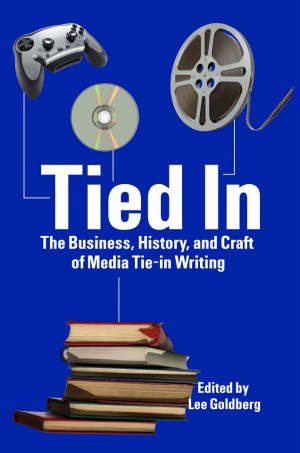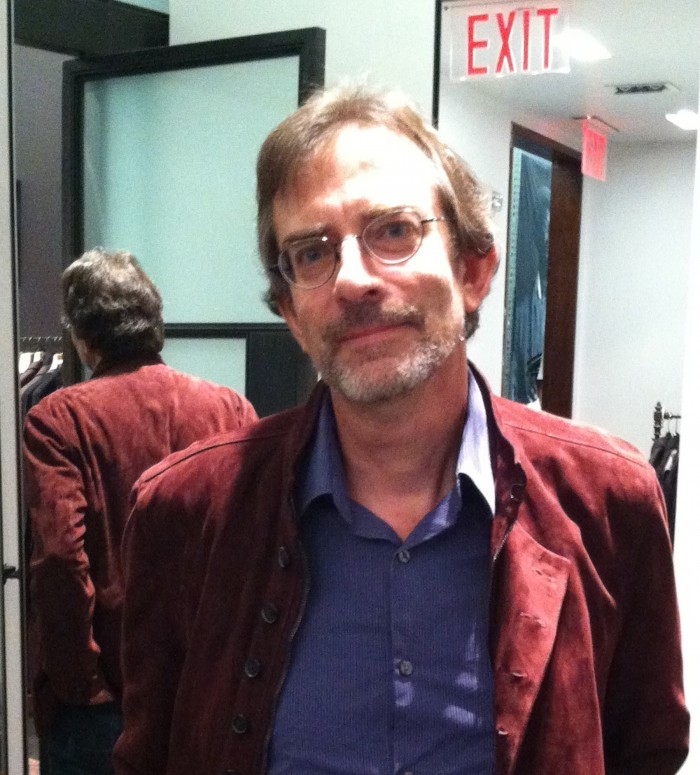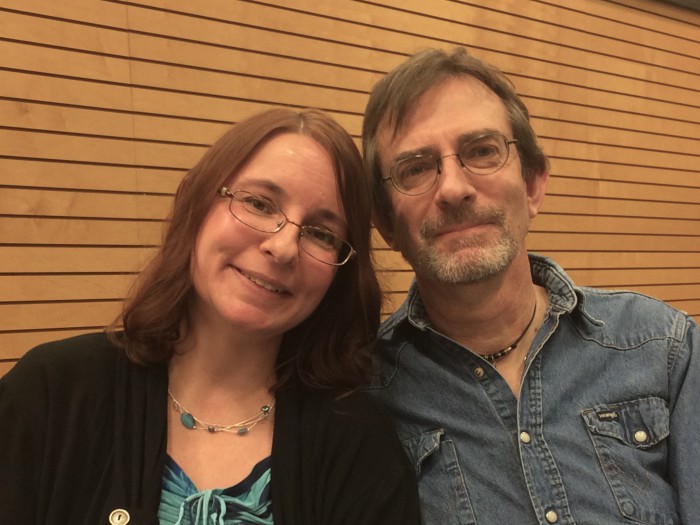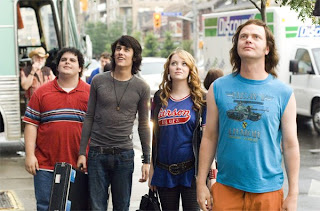He writes books based on the popular TV shows you love! Q and A with Jeff Mariotte #amreading #thriller #supernatural
Jeffrey J. Mariotte is the bestselling, award-winning author of fifty novels, including supernatural thrillers Season of the Wolf, Missing White Girl, River Runs Red, and Cold Black Hearts, horror epic The Slab, thriller The Devil's Bait, and the Dark Vengeance teen horror quartet.
He also writes occasional nonfiction, short fiction (some of which is collected in Nine Frights), and comic books, including the long-running horror/Western comic book series Desperadoes and graphic novels Fade to Black and Zombie Cop. With writing partner Marsheila Rockwell, he has published several short stories and a novel, 7 SYKOS. He has worked in virtually every aspect of the book business, as a writer, editor, marketing executive, and bookseller.
I’ve known Jeff for several years and was delighted when he agreed to answer a few of my questions.
DLS: When people see an author’s name, they often see it as a "brand", knowing what kind of story they’ll get. You’ve written in several genres from science fiction to weird westerns to horror. How do you define the “Jeff Mariotte Brand”?
JM: I'm convinced that writing in different genres has been harmful to my career, because readers tend to like a writer who stays put, who delivers basically the same thing book after book. Once you're well established, you can switch around--like Robert B. Parker eventually turning to the occasional western after writing a ton of mystery books in different series. But shifting around before your "brand" is established seems like a bad move, career-wise.
 That said, I don't see how I could have done it differently. I have to write what I'm moved to write at any given time. I'd get bored writing the same series character over and over. I haven't calculated out the wisest career path, but have written the books that felt like they needed to be written as they came along. I'm true to myself, if not to market considerations. My agent might prefer it the other way around, but I am who I am.
That said, I don't see how I could have done it differently. I have to write what I'm moved to write at any given time. I'd get bored writing the same series character over and over. I haven't calculated out the wisest career path, but have written the books that felt like they needed to be written as they came along. I'm true to myself, if not to market considerations. My agent might prefer it the other way around, but I am who I am.
I hope that readers know that when they pick up one of my books, they'll get a compelling, suspenseful tale that'll keep them turning the page; they'll get well-written and engaging stories populated with characters they'll believe in and care about. Regardless of genre, I try to always write books that will brighten a reader's day and life, that entertain and maybe inform and enlighten. My books are generally optimistic, even when they venture into dark places, and one of my central themes seems to be the idea that there's magic in the world, if only you know to look for it.
DLS: Who was your greatest writer influence/inspiration when you started? What are some books of theirs you would recommend?
 JM: I was a bookseller for years before I got published, so I was reading pretty extensively in my preferred genres--horror, mysteries, thrillers, sf, fantasies, westerns. Consequently, I had (and have) a lot of inspirations. Some have changed over the years, and others have been consistent. In the early days, I was strongly inspired by Robert E. Howard (particularly his Conan stories), the aforementioned Bob Parker (his Spenser novels), Raymond Chandler (Philip Marlowe) and Ross Macdonald (Lew Archer). At the same time, I've often been inspired by writers as varied as Stephen King (The Stand, The Shining, On Writing), William Goldman (Marathon Man, Boys and Girls Together) and Wallace Stegner (Angle of Repose, Recapitulation, Wolf Willow). More recent influences include James Lee Burke (any of his books, but especially the Robicheaux novels). That's a pretty male-centric list, but I could also add in works by Joan Vinge, Leigh Brackett, C.L. Moore, Laura Lippman, Barbara Kingsolver, and plenty of other talented women, as well as one of the best writers I know, Marsheila Rockwell.
JM: I was a bookseller for years before I got published, so I was reading pretty extensively in my preferred genres--horror, mysteries, thrillers, sf, fantasies, westerns. Consequently, I had (and have) a lot of inspirations. Some have changed over the years, and others have been consistent. In the early days, I was strongly inspired by Robert E. Howard (particularly his Conan stories), the aforementioned Bob Parker (his Spenser novels), Raymond Chandler (Philip Marlowe) and Ross Macdonald (Lew Archer). At the same time, I've often been inspired by writers as varied as Stephen King (The Stand, The Shining, On Writing), William Goldman (Marathon Man, Boys and Girls Together) and Wallace Stegner (Angle of Repose, Recapitulation, Wolf Willow). More recent influences include James Lee Burke (any of his books, but especially the Robicheaux novels). That's a pretty male-centric list, but I could also add in works by Joan Vinge, Leigh Brackett, C.L. Moore, Laura Lippman, Barbara Kingsolver, and plenty of other talented women, as well as one of the best writers I know, Marsheila Rockwell.
DLS: You recently married your writing partner, the talented Marsheila Rockwell. How do your collaborations work? How does collaborating compare to writing solo?
JM: Funny you should mention that...
 We collaborate very well, almost seamlessly. We have different strengths--she's a poet and her command of language is beautiful, while I'm a stronger plotter, for instance--but when we work together, our strengths complement each other, and by the time we're finished with a story, we usually can't tell who wrote what. We try to start with a solid outline so we know where we're going and what each other's vision of the overall story is (and because we both come out of a tie-in writing background, we're used to working with outlines). Then we trade off--scene by scene, chapter by chapter, whatever works at the moment and for any given project. On the first book of the Xena: Warrior Princess trilogy we're working on, we had a relatively tight deadline and had to be writing different chapters simultaneously, which was a little awkward. But we smoothed it all out, and it came out well in the end.
We collaborate very well, almost seamlessly. We have different strengths--she's a poet and her command of language is beautiful, while I'm a stronger plotter, for instance--but when we work together, our strengths complement each other, and by the time we're finished with a story, we usually can't tell who wrote what. We try to start with a solid outline so we know where we're going and what each other's vision of the overall story is (and because we both come out of a tie-in writing background, we're used to working with outlines). Then we trade off--scene by scene, chapter by chapter, whatever works at the moment and for any given project. On the first book of the Xena: Warrior Princess trilogy we're working on, we had a relatively tight deadline and had to be writing different chapters simultaneously, which was a little awkward. But we smoothed it all out, and it came out well in the end.
As for the difference between collaborating and solo work, it is a different beast. A solo story or novel is one person's vision, and everything in it, good or bad, is a reflection of that one person. A collaboration is necessarily a shared vision. I've written a lot of comic books and graphic novels, and because I don't draw, those are always collaborations. And I've collaborated with other writers, too. So it's not new to me. It does feel more natural with Marcy, and we work together better than I have with anyone else. Ideally, the result of a collaboration is a book or a story one writer couldn't have written, because each participant brings different skills and life experiences to the table, and that's what Marcy and I get when we write together. The fact that I get to be married to her is icing on the cake.
DLS: What insights have you gained from owning a bookstore that can help writers be more successful and stand out from the crowd?
JM: I think the experience of working in bookstores, managing them, and being an owner of one, has made me less ready to jump on board the e-book train. I think printed books are an ideal marriage of form and function--they don't require a power source, they don't break down or become corrupted, they're always there when you want to read and you can save your place with a bookmark or a piece of paper or a paper clip or whatever's handy. At the same time, I have a more realistic view of the book business than some people, who seem to think that Amazon is the only bookseller that matters. The truth is that printed books still far outsell e-books, and other outlets still sell more books in the U.S. than Amazon does, so if a writer focuses all of his or her efforts on Amazon, he or she is leaving a lot of potential sales on the table.
 DLS: Not only do you write in your own worlds, you’ve written novels and stories for Star Trek, NCIS, Buffy the Vampire Slayer, and other franchises. How does “playing in someone else’s sandbox” compare to creating your own world?
DLS: Not only do you write in your own worlds, you’ve written novels and stories for Star Trek, NCIS, Buffy the Vampire Slayer, and other franchises. How does “playing in someone else’s sandbox” compare to creating your own world?
JM: I love writing my original novels, and will always want to do that. Creating my own characters and involving them in situations entirely of my own devising is the ultimate creative experience. But it's also a blast to be asked to write novels about characters I love, like Conan, Xena, Spider-Man, Superman, and great TV shows like CSI and NCIS: Los Angeles. I get to tell stories in beloved fictional universes, and get paid for it--nothing wrong with that!
The skills that are called on are the same. I have to create characters, plot stories, write in an engaging and entertaining manner. And the truth is whether I'm writing in an existing fictional universe or my own, I have to be consistent and true to the rules of that universe as it's been developed. So the main difference is that in tie-in work, I have to try to capture voices that were devised by other writers (and sometimes actors). Fortunately, I'm pretty good at that.
DLS: If someone wanted to try their hand at writing and selling a novel in the world of a popular franchise, what would they need to do? How should they start?
 JM: They could start by visiting the website of the International Association of Media Tie-in Writers, IAMTW.org. There they can find out a lot about the nuts and bolts of the tie-in business, and maybe find out about licensed fiction lines they didn't even know existed. The organization has also released a book by its membership that contains more details about the trade.
JM: They could start by visiting the website of the International Association of Media Tie-in Writers, IAMTW.org. There they can find out a lot about the nuts and bolts of the tie-in business, and maybe find out about licensed fiction lines they didn't even know existed. The organization has also released a book by its membership that contains more details about the trade.
Typically (although there are exceptions) to write a tie-in novel, you have to have had at least one other novel professionally published. Publishers have already invested a lot of money to acquire a license, so they don't want to risk more by hiring a writer who hasn't proven the ability to write a publishable book. And there's often competition for tie-in gigs, so if it's a choice between a writer with a solid track record and an unknown new writer, the established pro will have the advantage. So the best thing a writer can do is write a good book, get it published by a reputable publisher, then approach the publisher of the licensed fiction line of interest and say, "Hey, I wrote X and I'd sure like to pitch you something for your Y line."
DLS: In addition to writing novels, you’ve written and edited comic books. How are writing comic books similar and different than writing novels or short stories? Do you collaborate with the artist ahead of time, or create any kind of storyboard in addition to writing?
 JM: As I mentioned above, because I don't draw the comics, each one is a collaboration, start to finish. I write the script before the artist draws it, so while I'm writing it I'm only speculating about what it'll look like at the end of the process. Usually what I'm seeing in my head is not much like what comes out on the page. From the very beginning of my career, I've had the good fortune of working with some amazing artists, whose work on my scripts has blown me away.
JM: As I mentioned above, because I don't draw the comics, each one is a collaboration, start to finish. I write the script before the artist draws it, so while I'm writing it I'm only speculating about what it'll look like at the end of the process. Usually what I'm seeing in my head is not much like what comes out on the page. From the very beginning of my career, I've had the good fortune of working with some amazing artists, whose work on my scripts has blown me away.
Ultimately, the skill sets the writer brings to the table are similar. You need to tell a story that's worth telling, that's interesting and surprising and suspenseful and is hopefully enlightening in some way. The differences are in the techniques and the outcome. In comics, you have to be willing to stand back and let the art tell the story. The writer makes up the story (in most cases), and puts it down in a script that no one will ever see, but the artist is the one whose interpretation of the story ends up being what the readers see. The writer has to let the artist do that job, and keep the words to a minimum so they don't get in the way of the art.
I don't try to direct the artist to any great extent. I tell them what has to be in each panel to make the story work, but leave it to them how the panel is composed, how the different panels fit onto the page, etc. I've worked, as an editor, with writers who don't trust their artists and do sketch layouts for them. Fortunately, in most cases, the artists I've worked with are far better at that than I would be.
DLS: What kind of research did you do writing the comic book biography of Barack Obama? Did you get to interview the President or did you work from other resources?
 JM: That project was fascinating, and required vast amounts of research. I didn't get to meet or speak with the President (though I'd still love to). I wrote it during the 2008 campaign and the first few months of his presidency, so at the time there weren't even any books about him other than the two he wrote himself. Obviously he was a well-known public figure, but what had been written about him was mostly journalism coming out on a constant basis, along with a few more in-depth magazine pieces. I read his books and every article about him I could get my hands on, and watched him on TV whenever possible to get a sense of his voice. The scripts were vetted by lawyers, and I had to have every fact triple-sourced, and had to be able to show where every line of dialogue came from. The project was originally three separate comic book issues that were collected into a single hardcover book, which was actually the first book-length biography written about him.
JM: That project was fascinating, and required vast amounts of research. I didn't get to meet or speak with the President (though I'd still love to). I wrote it during the 2008 campaign and the first few months of his presidency, so at the time there weren't even any books about him other than the two he wrote himself. Obviously he was a well-known public figure, but what had been written about him was mostly journalism coming out on a constant basis, along with a few more in-depth magazine pieces. I read his books and every article about him I could get my hands on, and watched him on TV whenever possible to get a sense of his voice. The scripts were vetted by lawyers, and I had to have every fact triple-sourced, and had to be able to show where every line of dialogue came from. The project was originally three separate comic book issues that were collected into a single hardcover book, which was actually the first book-length biography written about him.
DLS: I sense a certain passion for small towns on the southern border of the United States in your writing. What captivates you about those places in particular?
JM: Borderlands of all kinds are fascinating to me. I have written a lot about the US/Mexico border, but I've written about other borders, too--my Age of Conan trilogy, for example, was largely about the border between the Aquilonian Empire and the Pictish lands--which is kind of a parallel to Hadrian's Wall, where the Roman Empire ended and the wilderness began. Other borders in my fiction include borders between our world and another (or many others). Borders are where different people with different interests and backgrounds intersect. There's natural drama in that. Along our southwestern border, there are of course political issues, issues of crime and punishment, and the story of the human race--which is the ongoing story of migration--all of which are rich territory for fiction.
JM: The new book is 7 SYKOS, a collaboration with Marsheila Rockwell. It's kind of a science fiction/horror/thriller hybrid. Basically, a meteor has brought a spaceborne virus into the Phoenix metropolitan area, which has the effect of turning those infected into raging lunatics hungry for brains. It's incredibly virulent and there's no known cure or vaccine. In order to keep it from spreading throughout the nation (or the world), the military has fenced off the Valley of the Sun, and nobody is allowed in or out. But everyone knows that's only a temporary solution, so if something more permanent can't be figured out soon, the Valley's going to be nuked out of existence. Trouble is, the only way to come up with a fix is to get enough of the meteor to study, and nobody can get to it. But it turns out that the unique brain structure of psychopaths makes them immune to the virus. So they can go into the quarantine zone, to look for pieces of the meteor. And all they have to do is agree to perform an essentially altruistic act, learn how to play well together, and survive the onslaught of thousands of Infecteds who want to eat their brains. Nothing to it, right...?
DLS: Sounds amazing! Thanks for the wonderful and informative interview!
Connect with Jeffrey Mariotte online: website, facebook, twitter
Connect with Marsheila Rockwell online: website, facebook, twitter
Connect with Marsheila Rockwell online: website, facebook, twitter





Comments
Post a Comment
We would love to hear from you but hope you are a real person and not a spammer. :)